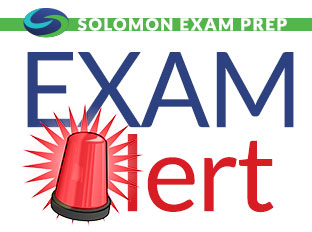This month’s study question from the Solomon Online Exam Simulator question database is now available.
***Submit your answer to info@solomonexamprep.com to be entered to win a $10 Starbucks gift card.***
Question (Relevant to the Series 24, Series 26, Series 27, Series 28, Series 62, and Series 99):
Which of the following is true regarding lost and stolen security reporting requirements?
I. All reports of securities that have been lost for one business day should be reported to the Commission
II. All reports of lost securities in which there is a substantial belief that theft was involved should be reported to the Commission
III. All reports of lost or stolen securities should be reported promptly to the FBI
IV. All reports of lost securities in which there is a substantial belief that theft was involved should be reported to the FBI
Answers:
A. I and III
B. II and IV
C. I and IV
D. II and III
Correct Answer: B. II and IV
Rationale: All reports in which there is substantial belief that theft was involved should be reported to the Commission within one business day of such a discovery. In addition, when there is believed to be criminal activity involved, it should be reported to the Federal Bureau of Investigation. Securities that have been lost for two business days should be reported to the Commission when criminal activity is not suspected.
Congratulations Roseann L., this month’s Study Question of the Month winner!
All study questions are from Solomon’s industry-leading Online Exam Simulator.




